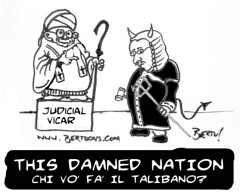 I was asked recently to give my two cents’ worth for an article being prepared by a MaltaToday journalist. He was looking into the recent history of KSU and more particularly the trend of ex-KSU council members becoming politicians (even more particularly Nationalist politicians). Was the university student council simply a machine geared to churn out potential nationalist MPs? Why only nationalist? Was (is) the university a nationalist party enclave? Is there a reason SDM still win a majority of votes at the elections? And of course… what is wrong with the “first past the post” system?
I was asked recently to give my two cents’ worth for an article being prepared by a MaltaToday journalist. He was looking into the recent history of KSU and more particularly the trend of ex-KSU council members becoming politicians (even more particularly Nationalist politicians). Was the university student council simply a machine geared to churn out potential nationalist MPs? Why only nationalist? Was (is) the university a nationalist party enclave? Is there a reason SDM still win a majority of votes at the elections? And of course… what is wrong with the “first past the post” system?
I will not delve into the answers that I gave here but what intrigues me is the perspective that is taken on the question of what we can call political careerism. Let me just say (I admit rather idealistically) that the whole KSU structure as conceived in the mid-90s only becomes counterproductive when allegiance to representing political party interests takes precedence over the aim of student representation. Back to careerism. The question is, is it only the nationalist side of our great divide that operates a school of aspiring careerists? A place in SDM, eventually a seat on the KSU council, a bit of coverage, maybe a spot of Local Council sparring and then a place in the party mechanism only to be nominated on a board or two once your party is in government. Who knows?
Would it take an anthropologist to really uncover the liens that intertwine in our very local and islandish form of networking that uses certain DNA traits such as “better the devil you know”? Take one step back. Look at the Aaron Farrugia’s of the Labour constellation. Sure they may not have made it to the coveted KSU executive post (though, had they done their representation homework properly they would have discovered that they had quite a role to play in the Social Policy Commission through Pulse). Still, you will find that the current administration is peppered with young, green, inexperienced hopefuls that are projected (many would add undeservedly) onto various committees, boards, and whatnot. All By TaghnaLkoll Appointment you would say. And you would be right.
It’s two sides of the same coin though. 25 years of nationalist administration, plus a petri dish of cliches as is the university population might have meant that SDM had the upper hand and were more prone to scrutiny when it came to careerism in the public eye (particularly after the idealist non-affiliated SDM petered out following its three year stint battling the impossible). This does not mean that what was true for the nationalist greasy pole is not true of the labourite one. People are so obsessed with this idea that there is some kind of nationalist infiltration of the university that they tend to forget that the two “schools” of partisan interference have sown (and reaped) their seeds in the university campus.Whether it is intentional or just an adaptation of the campus to the realities of political careerism is anyone’s guess.
It’s not just university you know. The ivory tower is only one field of recruitment. The networking system upon which our political parties have relied means that in every sector – from business to health to entertainment – there are massive interests that very often verge on the economic. We have seen how in the last few months the Labour government has scarcely been able to hide the web of interests that lie behind every supposed “policy” move. The brazen approach of discovery taken by Caruana Galizia’s Running Commentary is expediting the discovery of a web of interests that is being accommodated. From advertising brochures to insurance contracts to appointments on public boards. As Benigni would say “Qui è un mangia mangia generale”.
Surprised? Surely not. Also today former PN activist Frank Psaila “blogs” on MaltaToday about “The untouchables“. His is a particular slant about “people of trust” being necessarily appointed in particular strategic posts. Strategic to the government of course. Psaila can say a thing or two about what happened during the time of the PN administration because he was part of it. Caruana Galizia will have multiple willing “leakers” eager to disclose the secret entanglings of labour.
The real question is whether had there been an equally popular system of discovery during the previous administrations – one that lends itself to subtle contributions by “international networks” – whether it would have also uncovered a similar web of intertwined interests and favours. We had a former PN secretary general refer to a system of barter to explain how the party works. Combined with the aforementioned “better the devil you know” approach, you get the nagging feeling that just as a series of not too serendipitous connections would link the PM to a newly formed advertising agency or insurance company nowadays, you could have done very much the same exercise a while back.
True. The Labour system is much more outrageous and ostentatious with its careerist appointments. Competence and relevance (of qualification) are thrown out of the window. Within 21 months we have been able to witness arrogant dog-headedness and a multitude of forms of brazen nepotism. A dark shadow looms on most government tenders and nowadays when you hear the prime minister say that “he respects the court decision” (as in the case of the prohibitory injunction on the transport issue) you get the feeling that the tone is more “I will tolerate for now” than “I will humbly prostrate myself before the decision of the courts of law”.
In essence Labour are much more expert at exposing the ugly warts of the way our democratic system functions. What is sure is that 25 years of nationalist administration failed to strengthen the appropriate watchdogs that would be barking madly at this point. “Authorities” of all sorts are feebler and weaker. Labour fast-forwarded this weakness in the system by exploiting it further and further. The decline and fall of the police and army system under the able (not for good reasons) hands of Minister who has long lost the plot is the most obvious example. Weakened institutions – the ombudsman, the attorney general’s office, MEPA come to mind – abound. Elsewhere ministers disband independent committees with a simple phone call, MPs are suspected of toying around with tender documents… need I go on?
So the tune has not changed. The need for new politics remains greater than ever. The tragedy is that the system is ever so desperately ingrained in its methods that it becomes harder to see a way out. In such a small democracy as ours it it difficult (or impossible) to imagine the ultimate watchdog turning out to be the catalyst for such a change. Who is the ultimate watchdog? Oh that would be “the average voter”. But he might be too busy trying to expectantly get his foot into the gravy train (by appointment) to bother with the complicated nuances of the absolute reform that is ever so urgent and necessary for this country.
That is the sad truth of it all. A truth that Joseph Muscat turned into the secret underpinning of his strategy: That within the vast majority of the electorate lies an illusion of a legitimate expectation to get a piece of the pie by appointment and for free. So long as that illusion lasts the nation will continue to resemble a suicide of lemmings running towards a cliff’s edge*.
* Actually this is an urban myth. Lemmings do not really commit suicide** by collectively jumping off cliffs (see here for example). Voters on the other hand….
** The collective term for lemmings, though, is actually a “suicide” of lemmings. As we say in Maltese … Ħu il-fama…



